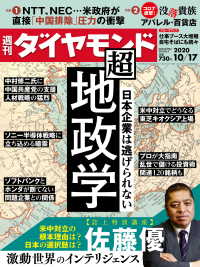- ホーム
- > 洋書
- > 英文書
- > Business / Economics
Full Description
This book discusses the crisis in modern governance rooted in the social fragmentation of modern society, the expanding diversity of values, beliefs and lifestyles generated by globalization and the technological revolution. Chapters advocate for a convergence of the institutional theory of polycentricity and the political philosophy of modus vivendi - live and let live - as a basic conceptual framework to uphold a peaceful and tolerant society, while presenting detailed analysis of a wide range of case studies.
This book is a critical resource for students and scholars of political science and public policy in addition to those studying political philosophy, sociology, moral theory or institutional systems. Policymakers and practitioners involved in governance will also find this invaluable due to its timely focus on the tensions generated by pluralism and how they can be alleviated.
Contents
Contents
Introduction: modus vivendi and polycentric governance systems 1
Paul Dragos Aligica and Jennifer Brick Murtazashvili
PART I Foundational perspectives 22
1 Liberalism, modus vivendi, and polycentricity: mapping the
terrain 23
David McCabe
2 From ideational to social: reframing modus vivendi 52
Aylon Manor
3 Two perspectives on the problem of peaceful coexistence:
John Gray's modus vivendi and David Mitrany's functionalism 74
Robert Gabriel Ciobanu
PART II Exploratory case studies 94
4 Embracing polygamy: a modus vivendi response to the human
rights position 95
Rebecca Yemo
5 Blockchain contractualism as modus vivendi: a praxis for
reconfiguring post-colonial state-building 111
Kaleb Demew
6 Liberal democracy, non-Western governance, and the
Bloomington School 135
Bryan Cheang
7 The government of things: acknowledging non-human agents
in institutional design 153
Alexandru Stefan Dincovici
8 Modus vivendi, polycentricity, and "decolonizing" the study
of the urban-rural divide 171
Kris Kanthak
9 Coproduced collective security and the resilience of modus
vivendi pluralism 185
Jennifer Brick Murtazashvili and Ali Palida






